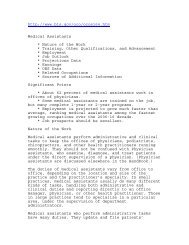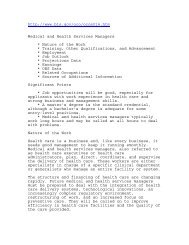http://www.bls.gov/oco/ocos027.htm Engineers ... - Aish Tamid
http://www.bls.gov/oco/ocos027.htm Engineers ... - Aish Tamid
http://www.bls.gov/oco/ocos027.htm Engineers ... - Aish Tamid
Create successful ePaper yourself
Turn your PDF publications into a flip-book with our unique Google optimized e-Paper software.
plants. Mining engineers are responsible for the safe,<br />
economical, and environmentally sound operation of<br />
mines. Some mining engineers work with geologists and<br />
metallurgical engineers to locate and appraise new ore<br />
deposits. Others develop new mining equipment or direct<br />
mineral-processing operations that separate minerals<br />
from the dirt, rock, and other materials with which<br />
they are mixed. Mining engineers frequently specialize<br />
in the mining of one mineral or metal, such as coal or<br />
gold. With increased emphasis on protecting the<br />
environment, many mining engineers work to solve<br />
problems related to land reclamation and water and air<br />
pollution. Mining safety engineers use their knowledge<br />
of mine design and practices to ensure the safety of<br />
workers and to comply with State and Federal safety<br />
regulations. They inspect walls and roof surfaces,<br />
monitor air quality, and examine mining equipment for<br />
compliance with safety practices.<br />
Nuclear engineers research and develop the processes,<br />
instruments, and systems used to derive benefits from<br />
nuclear energy and radiation. They design, develop,<br />
monitor, and operate nuclear plants to generate power.<br />
They may work on the nuclear fuel cycle — t he<br />
production, handling, and use of nuclear fuel and the<br />
safe disposal of waste produced by the generation of<br />
nuclear energy— o r on the development of fusion energy.<br />
Some specialize in the development of nuclear power<br />
sources for naval vessels or spacecraft; others find<br />
industrial and medical uses for radioactive materials,<br />
as in equipment used to diagnose and treat medical<br />
problems.<br />
Petroleum engineers search the world for reservoirs<br />
containing oil or natural gas. Once these resources are<br />
discovered, petroleum engineers work with geologists<br />
and other specialists to understand the geologic<br />
formation and properties of the rock containing the<br />
reservoir, determine the drilling methods to be used,<br />
and monitor drilling and production operations. They<br />
design equipment and processes to achieve the maximum<br />
profitable recovery of oil and gas. Because only a<br />
small proportion of oil and gas in a reservoir flows<br />
out under natural forces, petroleum engineers develop<br />
and use various enhanced recovery methods. These<br />
include injecting water, chemicals, gases, or steam<br />
into an oil reservoir to force out more of the oil and<br />
doing computer-controlled drilling or fracturing to<br />
connect a larger area of a reservoir to a single well.





